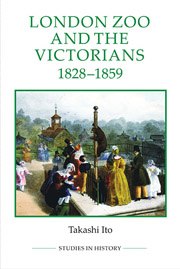Book contents
- Frontmatter
- Contents
- List of figures
- List of tables
- Acknowledgements
- Abbreviations
- Dedication
- Introduction: the zoo in history
- 1 The site of animal spectacle
- 2 Collecting and displaying
- 3 The question of access
- 4 Between science and commerce
- 5 Illusionary empire
- Conclusion: the Darwinian moment
- Appendix
- Bibliography
- Index
Conclusion: the Darwinian moment
Published online by Cambridge University Press: 05 April 2014
- Frontmatter
- Contents
- List of figures
- List of tables
- Acknowledgements
- Abbreviations
- Dedication
- Introduction: the zoo in history
- 1 The site of animal spectacle
- 2 Collecting and displaying
- 3 The question of access
- 4 Between science and commerce
- 5 Illusionary empire
- Conclusion: the Darwinian moment
- Appendix
- Bibliography
- Index
Summary
Charles Darwin loved to visit the London Zoo. He wrote to his sister Caroline in April 1831 that ‘what I liked most in all London is the Zoolog[ical] Gardens: on a hot day when the beasts look happy and the people gay it is most delightful’. In March 1838, after returning from his voyage on the Beagle, Darwin visited the zoo again. He was fortunate enough to see the rhinoceros emerging from her house and galloping in the enclosure ‘surprisingly quickly, like a huge cow’. The elephant in the next yard responded to his neighbour and began ‘trotting himself’ and ‘squealing & braying like a half dozen broken trumpets’. The most exciting attraction of the year was, however, Jenny, the first orangutan exhibited to the public at the London Zoo. Darwin observed her intelligence and emotional expression and compared her to a human child:
I saw also the Ourang-outang in great perfection: the keeper showed her an apple, but did not give it her, whereupon she threw herself on her back, kicked & cried, precisely like a naughty child. – She then looked very sulky & after two or three fits of passion, the keeper said, ‘Jenny if you will stop bawling & be a good girl, I will give you the apple’ – She certainly understood every word of this, & though like a child, she had great work to stop whining, she at last succeeded, & then got the apple, with which she jumped into an armchair & began eating it, with the most contented countenance imaginable.
- Type
- Chapter
- Information
- London Zoo and the Victorians, 1828-1859 , pp. 162 - 172Publisher: Boydell & BrewerPrint publication year: 2014

